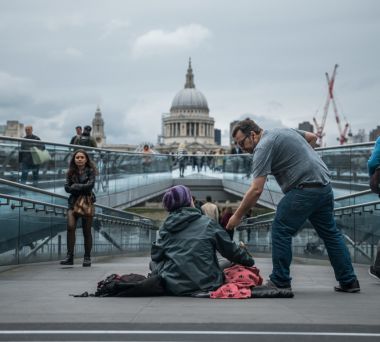How can we make a difference for those on the margins?

Blessed are those whose help is the God of Jacob,
whose hope is in the LORD their God.
He is the Maker of heaven and earth,
the sea, and everything in them –
he remains faithful for ever.
He upholds the cause of the oppressed
and gives food to the hungry.
The LORD sets prisoners free,
the LORD gives sight to the blind,
the LORD lifts up those who are bowed down,
the LORD loves the righteous.
The LORD watches over the foreigner
and sustains the fatherless and the widow,
but he frustrates the ways of the wicked.
The LORD reigns for ever,
your God, O Zion, for all generations.
Praise the LORD.
I know that the LORD secures justice for the poor
and upholds the cause of the needy.
Surely the righteous will praise your name,
and the upright will live in your presence.
Early on in the pandemic, Madonna infamously referred to Covid-19 as a 'great equaliser'.
The fact that she said it from a bath full of rose petals was just one reason to call her statement into question. Such 'equalisers' don't really exist. Dig a little deeper and you'll almost always find that the rich, powerful, and privileged will have an easier time of it.
Black and South Asian people have been hit hardest by Coronavirus, white-collar workers have continued working from home whilst other sectors have been decimated, and rich nations are experiencing a vaccine-fuelled recovery whilst the global majority continue to struggle.
The Bible is no stranger to such inequality. Righteousness is fundamentally relational, but because of sin these relationships are damaged – we turn away from God and in on ourselves, leading to greed and oppression. Fallen people then form broken structures, leading to institutional injustice.
Imagine a 400-metre race where some competitors had a massive head start. It wouldn't be fair for the whole field to start at the same time. In the same way, where inequality exists it's insufficient simply to treat everyone the same and assume it'll all work out. We need to address inequality and the systems that cause it.
And we have a God who cares especially for the poor. Psalms such as the ones cited above show what John Stott calls 'a God who desires justice and asks us, as his people... to champion the cause of the poor and the powerless'.
But who are the powerless? Scripture consistently refers to the widow, the fatherless, and the foreigner. Equivalents today might include the child in social care, the homeless man, the asylum seeker, the trauma survivor, the lonely elderly woman. God's priority is to 'secure justice' for those on the margins, and we're called to join this work.
So, practically, how do we use our everyday lives to undo inequality? One way is through advocacy, partnering with God to restore social structures and empower the disadvantaged. Not ignoring or abandoning our privilege, but stewarding it lovingly on behalf of others.
This might look like listening and learning to find out where inequality exists on our frontlines. It might involve our jobs, working for justice as well as for profit. It might mean signing petitions, or 'upholding the cause' of the voiceless in everyday conversations with friends, families, or neighbours. As we advocate for the marginalised, may our lives reflect God's priorities.
Matt Jolley is Editor of the London Institute for Contemporary Christianity's Word for the Week, a short reflection on a passage from the Bible, with a frontline focus. This article orginally appeared on the website of the LICC and is printed here with permission.











